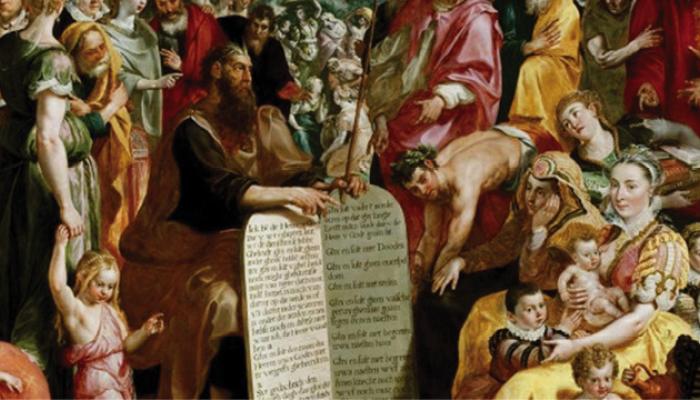
4.8 Wat is de verhouding tussen geloof en daden?
Leven als christen betekent dat we bewust besluiten wat we wel en niet doen, vanwege onze band met Jezus. De Bijbel zegt: “Zonder daden is het geloof dood” (Jak 2,26)Jak 2,26: Zoals het lichaam dood is zonder de ziel, zo is het geloof dood zonder de daad.. Als je echt in Jezus gelooft, dan wil je ook doen wat Hij van je vraagt: houden van God en je naasten.
Dat laten we bijvoorbeeld zien doordat we ons aan de Tien Geboden proberen te houden, ook al lukt dat niet altijd. God kijkt meer naar de liefde waarmee we geven, dan naar de hoeveelheid van onze gaven (Mar 12,41-44)Mar 12,41-44: Gezeten tegenover de offerkist, bekeek Hij hoe de menigte kopergeld in de offerkist gooide. Veel rijken gooiden er veel in. Er kwam een arme weduwe, die er twee muntjes in gooide, ter waarde van een quadrans. Hij riep zijn leerlingen bij zich en zei tegen hen: ‘Ik verzeker jullie, die arme weduwe gooide meer in de offerkist dan alle anderen. Want allen gooiden er iets in van hun overvloed, maar zij gooide er van haar armoede alles in wat ze had, heel haar levensonderhoud.’. Als christenen hebben we de opdracht om ons voor al onze medemensen in te zetten.
By what is love for the poor inspired?
Love for the poor is inspired by the Gospel of the Beatitudes and by the example of Jesus in his constant concern for the poor. Jesus said, “Whatever you have done to the least of my brethren, you have done to me” (Matthew 25:40). Love for the poor shows itself through the struggle against material poverty and also against the many forms of cultural, moral, and religious poverty. The spiritual and corporal works of mercy and the many charitable institutions formed throughout the centuries are a concrete witness to the preferential love for the poor which characterizes the disciples of Jesus. [CCCC 520]
What significance do the poor have for Christians?
Love for the poor must be in every age the distinguishing mark of Christians. The poor deserve not just a few alms; they have a claim to justice. For Christians there is a special obligation to share their goods. Our example in love for the poor is Christ.
“Blessed are the poor in spirit, for theirs is the kingdom of heaven” (Mt 5:3)—that is the first sentence in Jesus’ Sermon on the Mount. There is material, emotional, intellectual, and spiritual poverty. Christians must look after the needy of this earth with great consideration, love, and perseverance. After all, on no other point will they be evaluated by Christ so decisively as on their way of treating the poor: “As you did it to one of the least of these my brethren, you did it to me” (Mt 25:40). [Youcat 449]
When we hear, 'Your faith has saved you', we do not understand [God] to say absolutely that those who have believed in any way whatever will be saved, unless also works follow. [St. Clement of Alexandria, Stromata, Bk. 6, Chap. 14 (MG 9, 329)]





